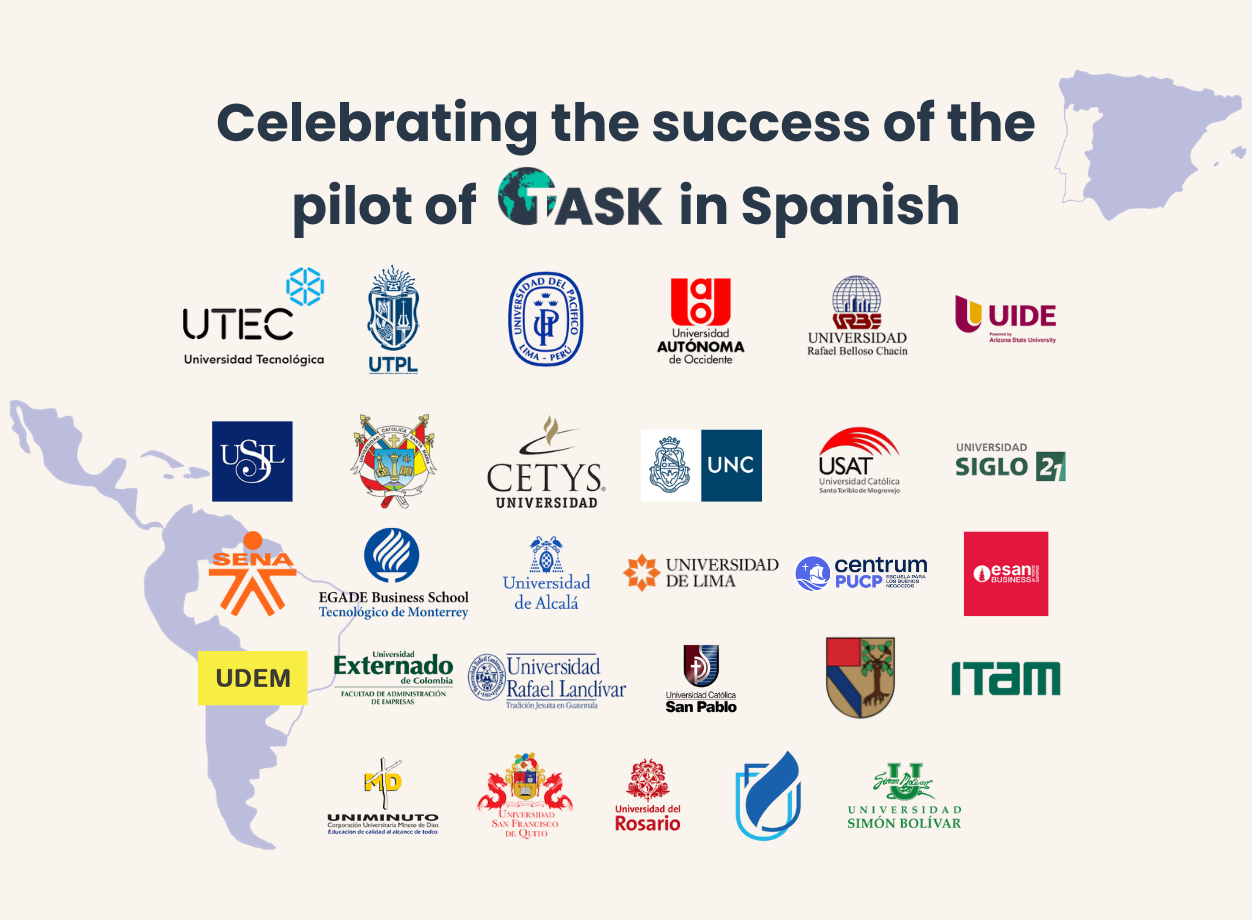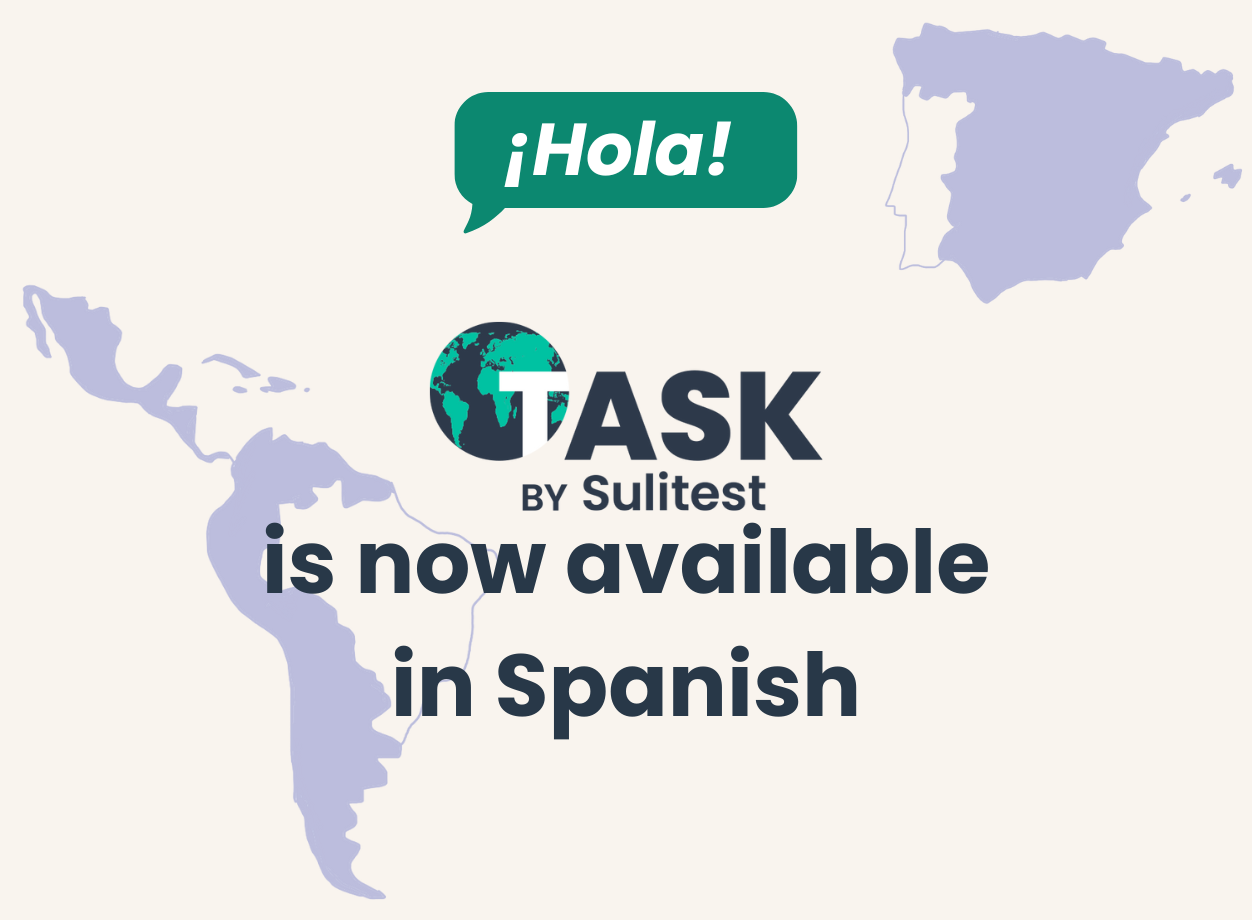
Bringing TASK™ to Spanish-speaking learners: Insights from our Pilot

As we prepare to launch TASK™ in Spanish in early 2026, we are thrilled to celebrate the successful completion of our pilot phase. A total of 29 higher education institutions across Latin America and Spain took part in the pilot. Together, they contributed 3,775 completed assessments, providing rich data that now strengthens the reliability, fairness, and global comparability of TASK™, our global sustainability knowledge assessment.
We are deeply grateful for the enthusiasm and commitment shown by every participating institution. Their engagement demonstrates the region’s strong engagement, collaboration, and readiness to advance sustainability education.
Why we did the pilot
When bringing TASK™ to Spanish-speaking learners, our priority was to make sure that the assessment works fairly and reliably in this new language. Because the original version of TASK™ was developed in English and French, we needed to make sure that the Spanish translation does more than simply “sound right.” It has to function the same way: questions should feel equally clear, equally challenging, and measure the same underlying competencies across all languages. After all, TASK™ is not a simple quiz—it’s a psychometric assessment, built using item response theory (IRT).
The pilot allowed us to gather real responses from students in Spanish-speaking institutions. With this data, we could verify whether:
- Spanish questions behaved similarly to their English and French counterparts
- No question became unintentionally easier or harder in Spanish
- The assessment remained balanced and comparable across languages
In other words, we wanted to ensure that a student’s score reflects their understanding—not the language of the test.
A collective effort strengthening sustainability education across Latin America
Thanks to the strong engagement of partners across the region, the pilot brought together a diverse group of universities from Argentina, Colombia, Ecuador, Guatemala, Mexico, Peru, Spain, Uruguay, and Venezuela.
We extend a special thank you to Universidad Tecnológica del Uruguay, our first Change Leader in Latin America, for your commitment and readiness. A special acknowledgment also goes to CETYS Universidad (Mexico) and Universidad Simón Bolívar (Colombia), each of which engaged more than 1,000 students, significantly enriching the dataset and reinforcing the robustness of the validation process.
Beyond supporting our work, participating institutions were able to gain a first experience with our assessment. Debrief meetings were organized to explore the TASK™ dashboard and preliminary results. Dr. Celsa Guadalupe Sánchez Vélez, Director of the College of Business and Management, CETYS Universidad stated “We value this collaboration, as the results will provide us with an initial diagnostic that will help us strengthen and enrich our curriculum on sustainability topics.”

We are also deeply grateful to Evelyne Gross and Fabrice Galia, our ambassadors in Latin America. Their extensive experience and longstanding support for institutions in the region were instrumental in connecting Sulitest with many of the participants in this pilot. Their ongoing work helps universities identify strengths, foster partnerships, and deepen their contributions to sustainable development.
Another key moment in expanding our regional collaboration was our participation in CLADEA. This influential network plays a vital role in accelerating positive change across Latin America, and we are honored to contribute to its mission while connecting with forward-thinking institutions through its events.
How this informs our future work
The results of this pilot now guide our next steps. They allow us to fine-tune any items that did not perform as expected, ensuring that each question functions clearly and consistently in Spanish. They also help us validate the comparability of results, so that a TASK™ score—or the certificate students receive—has the same meaning and the same value worldwide, no matter which language version was used. More broadly, the pilot strengthens the global robustness of TASK™ and ensures that TASK™ in Spanish is not simply a translation, but a fully validated, high-quality version of the assessment—fair, reliable, and ready to serve learners across the Spanish-speaking world.
Spanish-speaking institutions – discover how TASK can support your students and strengthen your sustainability curriculum. Connect with us to learn how you can benefit from our assessment
Participating Institutions
We extend our gratitude to the institutions who participated in the pilot:
Argentina
- Universidad Siglo 21
- Universidad Nacional de Córdoba
Colombia
- Universidad Externado
- Universidad Autónoma del Occidente
- Universidad Simón Bolívar
- Servício Nacional de Aprendizaje (SENA)
- Universidad del Rosario
- Corporación Universitaria Minuto de Dios
Ecuador
- Universidad Internacional de Ecuador
- Universidad Tecnológica ECOTEC
- Universidad Técnica Particular de Loja
- Universidad San Francisco de Quito
Guatemala
- Universidad Rafael Landívar
Mexico
- Universidad Panamericana
- EGADE Business School
- CETYS Universidad
- Instituto Tecnológico Autónomo de México
- Universidad de Monterrey
Peru
- Universidad Católica de Santa María
- ESAN Graduate School of Business
- Universidad San Ignacio de Loyola
- Universidad Católica Santo Toribio de Mogrovejo
- Centrum PUCP
- Universidad Católica San Pablo
- Universidad de Lima
- Universidad del Pacífico
Spain
- Universidad de Alcalá
Uruguay
- Universidad Tecnológica del Uruguay
Venezuela
- Universidad Rafael Belloso Chacín












